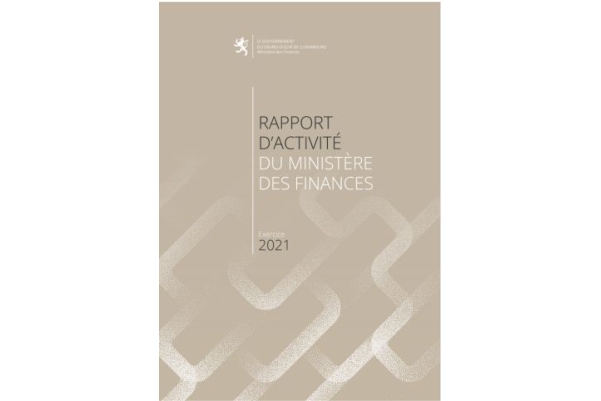 Credit: MFIN
Credit: MFIN
Luxembourg's Ministry of Finance has published its 2021 activity report illustrating its work during the year, including numerous infographics and photographs of key events.
The document contains detailed information on the works at the Ministry of Finance as well as the authorities which depend on it, namely the Administration of Direct Contributions (ACD), the Registration, Domains and VAT Administration (AEDT), the Cadastre and Topography Administration (ACT) and the Customs and Excise Administration (ADA).
Yuriko Backes, Minister of Finance, who started her term in January 2022, said: “2021 is characterized by a strong recovery. This is explained by the massive aid provided by the government during the pandemic to support citizens and businesses, but also by efforts in terms of digitalisation and sustainable development. I thank my predecessor Pierre Gramegna, who led the ministry with caution during this difficult year of crisis".
In the second year of the pandemic, the government continued to support the economy but less aid was needed than in the previous year. In all, approximately €2.7 billion have been disbursed in favour of the economy since the start of the crisis, including €2 billion in 2020 and €681 million in 2021. A series of measures contributed to supporting the most affected economic sectors. Partial unemployment, leave for family reasons, direct aid, deferral of payment to the tax authorities and the State guarantee on loans are few examples of these measures.
According to the first report on COVID-19 loans, 415 loans were granted until 31 December 2021, the expiry date of the subscription period, for a total amount of €194 million, of which €165 million were guaranteed by the state. In addition, the Luxembourg State issued a loan of €2.5 billion at negative interest to deal with COVID-19, benefiting from excellent financial conditions thanks to its "AAA" rating.
The resistance of the Luxembourg economy to the pandemic is largely based on the financial sector, which has more than 50,000 direct jobs and represents a third of GDP. This sector has been able to resort to teleworking. In this sense, the government has repeatedly extended the amicable agreements with Belgium, Germany and France in favor of the 200,000 cross-border workers. Thanks to agreements with France and Belgium, the duration of teleworking has been extended to 34 days. The Ministry of Finance has also been able to use teleconferences. Thus, Pierre Gramegna has participated in more than 60 online conferences and events in Luxembourg and abroad.
Digitilisation continued within all the administrations under the supervision of the ministry. An example is the MyGuichet assistant, which since 7 February 2022 has made it possible to declare income in a simpler and faster way for natural persons. At the same time, the ACD has equipped itself to process the declaration completely digitally in order to considerably shorten its processing time. The approach will be extended later to obtain coverage for all taxpayers. Currently, approximately 70% of the 300,000 individual taxpayers can use this new approach.
Luxembourg has continued its efforts in the area of economic transition with the “Recovery and Resilience Plan (PRR)” which was among the first to be validated: Ursula von der Leyen, President of the European Commission, came in person to Luxembourg on 18 June 20221 to give the green light. For a successful transition to a post-COVID-19 economy that is greener, more digital, more resilient and better adapted to current and future challenges, the aid amounts to €93 million. On the Luxembourg Stock Exchange, the first bond issued by the European Union to finance the recovery plan for Europe, known as NextGenerationEU, was listed on 22 June 2021.
Luxembourg alone represents more than 40% of the assets under management of ESG funds in Europe. In 2021, the Luxembourg Stock Exchange exceeded the bar of 1,200 sustainable bonds listed, which have raised more than €600 billion to finance green, social and sustainable development projects around the world since 2016. In the year 2021, the Luxembourg Sustainable Finance Initiative has announced its strategy for sustainable finance. In September 2021, one year after issuing the first sustainable sovereign bond in Europe worth €1.5 billion, Luxembourg published the first report on the allocation of the €770 million already invested as well as on the expected environmental and social impact of these investments.
The year 2021 was also marked by a large volume of bills and Grand-Ducal regulations. Seventeen new bills were tabled, 23 grand-ducal regulations were published and 21 laws passed. In addition, 148 parliamentary questions were handled by the Ministry of Finance.
Numerous working meetings and visits took place within the framework of the Eurogroup, Ecofin, the OECD and international organisations. Luxembourg has also signed double taxation agreements with Ethiopia, Rwanda and Ghana.
The centenary of the signing of the convention establishing the Belgo-Luxembourg Economic Union (BLUE) was celebrated in Brussels in the presence of political figures, including the Minister of Finance.
Pierre Gramegna took the opportunity of the publication of the annual report to thank the more than 2,000 employees of the Ministry of Finance and the administrations under his supervision and to wish Yuriko Backes success ahead.
The full report and its annexes are now available on the Ministry of Finance website under "Publications" section.








